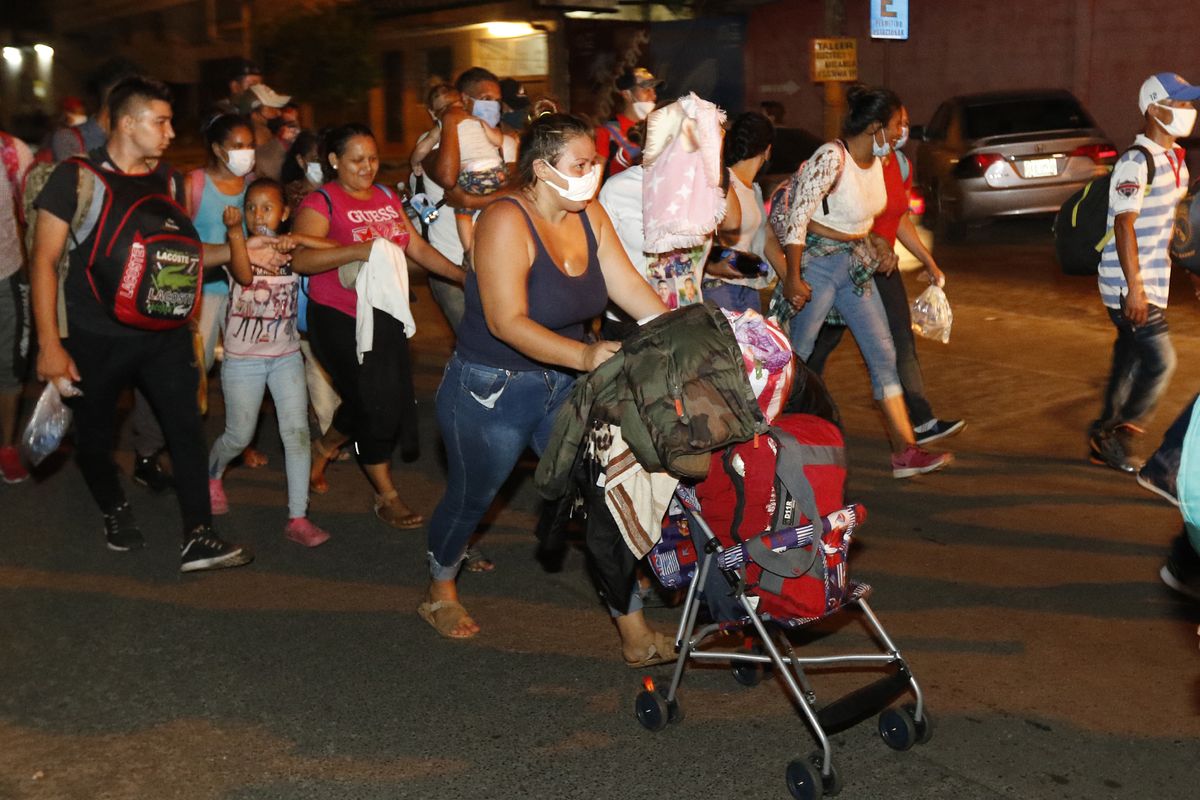Hundreds of Honduran migrants set out for U.S. amid pandemic

GUALÁN, Guatemala – About 2,000 Honduran migrants hoping to reach the United States entered Guatemala on foot Thursday morning, testing the newly reopened frontier that had been shut by the coronavirus pandemic.
Authorities had planned to register the migrants as they crossed and offer assistance to those willing to turn back, but the group crossed the official border at Corinto without registering, pushing past outnumbered Guatemalan police and soldiers who made little attempt to stop them.
In one group were four teenagers, all friends and neighbors from San Pedro Sula, from which hundreds of migrants had set out the previous night. The teens decided to leave after seeing others organize on Facebook.
The youngest, 15-year-old Josty Morales, said he wanted to live the “American dream” and was looking for a way to support his 6-month-old son at home. “There’s no work. The necessity strangles you,” he said.
Within hours of the border crossing, Guatemalan authorities reported the first migrant death. A person tried to climb aboard a moving flatbed trailer, but fell under its wheels. Authorities did not immediately provide any additional details.
Central American migrants began traveling in large groups in recent years, seeking safety in numbers and in some cases avoiding the cost of smugglers. Calls for a new migrant caravan to leave Oct. 1 had circulated for weeks on social media.
The odds of a large migrant caravan reaching the U.S. border, already low, have grown increasingly slim over the past year. Under pressure from the United States, Mexico deployed its National Guard and more immigration agents to break up attempted caravans last year. They dispersed large groups of migrants attempting to travel together in southern Mexico. Actually crossing into the U.S. legally is virtually impossible now with pandemic, and entering illegally is as difficult as ever.
The departure of the new group was reminiscent of a migrant caravan that formed two years ago shortly before U.S. midterm elections. It became a hot issue in the campaign, fueling anti-immigrant rhetoric. While the caravans draw attention, they really only account for a small fraction of the daily migration flow by small groups that pass unnoticed through Central America and Mexico.
By mid-afternoon the migrants who crossed into Guatemala on Thursday had strung out in small groups for miles along the highway, as some caught rides and others walked under the hot sun.
Christian Martínez, 19, saw leaving as a way out when few other options were apparent in Honduras. “If we stay what is left for us is to become criminals because there’s no way to survive,” he said.
Already halfway to Guatemala City, Martínez and his companions had advanced on foot and with the occasional ride. They said they all carried masks but weren’t worried about the pandemic.
The larger group that set out Wednesday night appeared to be mostly young men, though there were the occasional small children being pushed in strollers.
At the border, Guatemalan officials were asking the migrants to provide documents showing a negative COVID-19 test – even though last week they said they wouldn’t require a test for those spending fewer than 72 hours in the country.
But about 2,000 migrants hustled through without registering. In addition, AP journalists saw others crossing the border illegally near the formal crossing. There were no reports of violence.
Guatemala’s military said it was establishing interior checkpoints to review migrants’ documents. In the past, authorities have set up roadblocks deeper in the country to winnow down larger groups. A regional agreement allows citizens of Honduras to transit through Guatemala.
Governments throughout the region made it known they were watching Wednesday.
Guatemala presidential spokeswoman Francis Masek said in a statement that authorities would enforce the law.
“We understand that the economic situation of the Northern Triangle countries has has become more critical with the effects of the pandemic, but this does not justify taking the risk for adults, much less children, of starting the trip toward the United States, which is so dangerous and includes many situations that can put lives at risk,” the statement said.